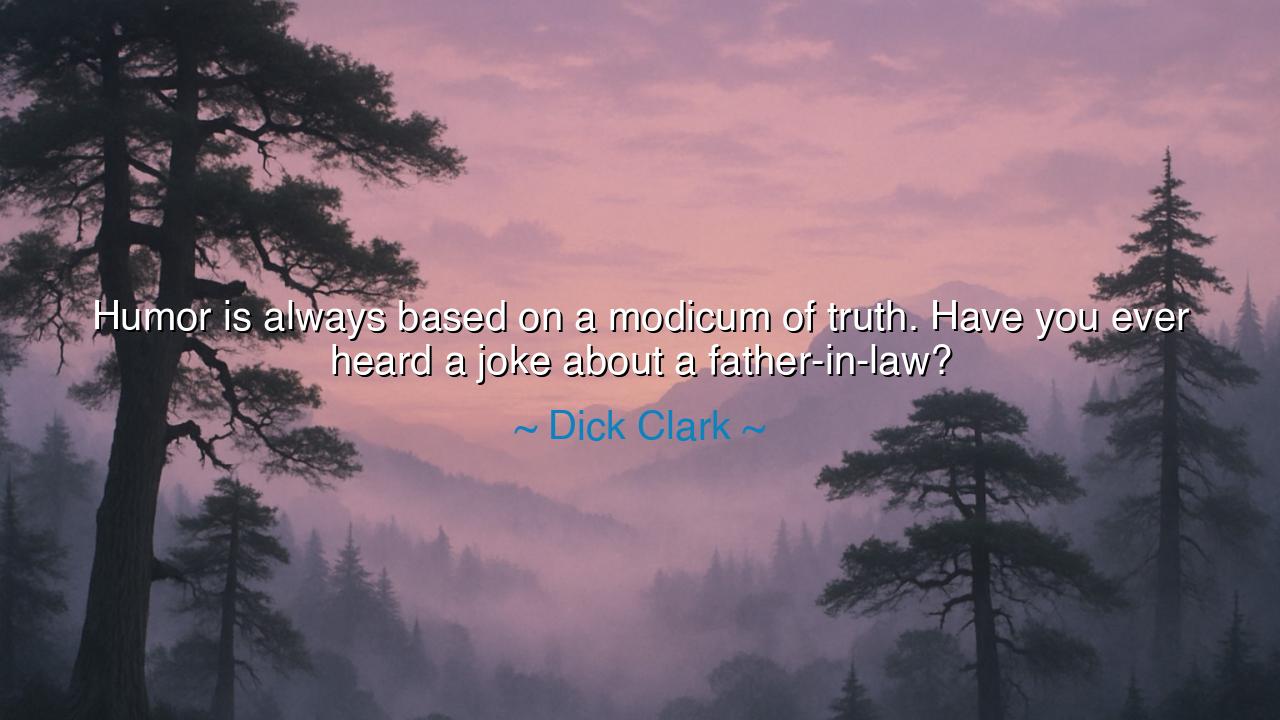
Humor is always based on a modicum of truth. Have you ever heard
Humor is always based on a modicum of truth. Have you ever heard a joke about a father-in-law?






In the bright wit and quiet insight of Dick Clark, a man who understood the pulse of people and laughter, we find a saying both playful and profound: “Humor is always based on a modicum of truth. Have you ever heard a joke about a father-in-law?” What seems at first a jest about family life is, in truth, a revelation about the nature of humor, truth, and the curious way laughter unveils the hidden fabric of the human soul. Clark, known for his warmth and keen observation of human nature, reminds us that laughter is not born of fantasy, but of reality seen from a gentler angle. Every joke, no matter how light, springs from something true—some shared experience, some flaw or folly that all humanity recognizes, even when we pretend not to.
The origin of this truth stretches far beyond the modern stage. The ancients themselves, those who gathered in the marble theaters of Greece or around the fire-lit circles of old, knew that humor is not mere mockery—it is wisdom wrapped in mirth. The playwright Aristophanes once wielded comedy as a weapon and a balm, using laughter to expose the vanity of the powerful and the foolishness of the crowd. The people laughed, yes, but they laughed because they saw themselves reflected in the jest. Truth hides beneath every smile; recognition hides beneath every laugh. So when Dick Clark wryly asks, “Have you ever heard a joke about a father-in-law?” he points to the subtle truth that we laugh most at what touches the tender, familiar patterns of life. The father-in-law, a figure often distant and dignified, does not provoke the same universal recognition as the meddlesome mother-in-law or the bumbling husband. Humor follows truth, and truth follows the common heart.
Humor, then, is one of the oldest forms of truth-telling. It allows the speaker to reveal what others dare not say. It shines light into corners where solemn speech would be unwelcome. A joke can express what anger, grief, or fear cannot. In its laughter hides courage—the courage to name weakness, absurdity, and contradiction without despair. This is why the jester was once the wise fool, the only man who could speak truth to kings. His laughter was both shield and sword. So too, Dick Clark, in his time, understood that humor connects people more deeply than sermons or speeches. It binds us by our shared flaws, reminding us that to be human is to be imperfect—and to be imperfect is to be laughable, lovable, and alive.
History offers many examples of laughter as the bridge between truth and understanding. Consider Abraham Lincoln, whose humor softened even the fiercest quarrels. When accused by critics of being two-faced, he replied, “If I had two faces, do you think I’d be wearing this one?” The crowd roared with laughter, and in that laughter, tension dissolved. Beneath the jest lay truth—his humility, his weariness, his humanity. In moments of hardship, Lincoln’s humor became not an escape, but a form of wisdom—the art of facing sorrow with grace. So too, Dick Clark’s saying reminds us that every true joke has something healing in it, because it makes us confront the truth without bitterness.
Yet there is a deeper layer to Clark’s observation. In asking why there are no jokes about the father-in-law, he points to how humor reveals our relationships, our hidden anxieties, and our cultural truths. We joke about what we struggle with—the mother-in-law who interferes, the boss who frustrates, the politician who blunders. The absence of jokes about the father-in-law is not oversight but symbolism: we do not jest about what we do not feel deeply. Humor thrives where emotion and tension exist; where reverence or distance reigns, laughter fades. Thus, in the landscape of human relationships, laughter grows in the fertile ground of truth, not the barren soil of indifference.
To live wisely, then, we must learn to see truth through laughter. When life seems cruel, humor softens it; when people err, humor forgives them. The one who can laugh at himself is already free from pride’s tyranny. The one who can find truth in laughter will never be deceived by flattery or falsehood. Let us, therefore, cultivate humor not as a weapon of cruelty, but as a mirror of understanding. Laugh not to belittle others, but to awaken compassion in yourself. For laughter, when pure, is not mockery—it is light breaking through the shadow of human pretense.
And so, as the ancients would counsel, remember that humor and truth walk hand in hand. Seek the laughter that uplifts, not the laughter that wounds. When you hear a joke, listen for the truth behind it; when you speak one, let it reveal kindness rather than scorn. For in laughter that springs from truth and love, there is healing power. Dick Clark, in his simple wit, teaches us that even the lightest jest can be a window into the deepest realities—that to laugh honestly is to see clearly, and to see clearly is to live wisely.






AAdministratorAdministrator
Welcome, honored guests. Please leave a comment, we will respond soon